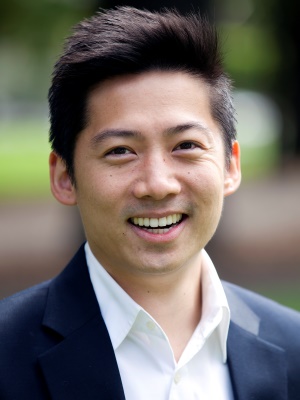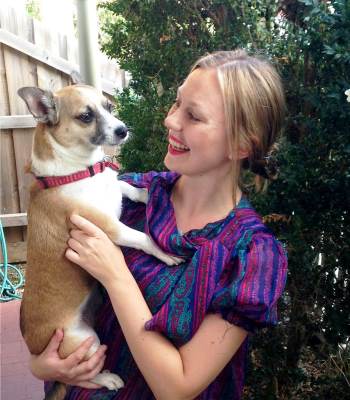Ralph Waldo Emerson wrote "…to know even one life has breathed easier, because you have lived. This is to have succeeded" (i). For many alumni of Melbourne Law School the spirit of giving their time and skills has become a part of who they are.
When Melbourne Law School made the call for alumni under 40 years of age to talk about their community volunteering for this story, more than 150 nominations were received in a very short space of time – showing that the spirit of giving back is a strong part of the alumni community.
They are among more than six million Australians (around 1.5 million Victorians) who volunteer, although these numbers do not include informal volunteering. Calculations on the economic value of volunteering range anywhere from $14.6 billion to $200 billion per annum, and include everything from tin rattling and Meals on Wheels to citizen scientists and pro bono lawyers.
Alan Wu (LLB 2010) is bemused when asked why he volunteers. "It's a curious question, isn't it? As if wanting to be involved in one's community is special or strange or heroic," he says.

Alan's earliest memory of structured volunteering was from year seven, when he contributed to Australia's first national media festival of youth culture and the arts. Since then he has racked up a very long list of accomplishments in representative and leadership roles. As the Chair of Australia's national youth affairs peak body, Alan helped lobby for $2 million in new, annual federal funding to ensure that young people are represented in national discussions. For this, Alan was recognised by the Australian Human Rights Commission and named a finalist in the Young Australian of the Year Awards. He served internationally as Special Envoy for Young People to the United Nations Environment Programme and on the Australian National Commission for UNESCO.
Now, in addition to working as a lawyer for the Australian Government, he serves on the Board of Directors of Oxfam Australia, as the Chair of the Mount Stromlo High School Board, and in the World Economic Forum's Global Shapers Community. He reflects that his volunteering has often centred on ways to encourage young people to become part of the development of policies and systems that affect them: "Our communities do best when we include everyone," Alan says.
For Anastasia Smietanka (LLB 2011), inclusion has also been a driving force. A former Greens candidate, she has volunteered pro bono with the Inner Melbourne Community Legal and Justice Connect's Seniors Law clinics, and commits time to the Brotherhood of St Laurence Atherton Gardens Breakfast Club, a program which provides school-day breakfasts to the children on the Fitzroy housing estate. "I see myself as being in a fairly privileged position and I believe all of us should give back, given that we are so fortunate. When you see so many without, you just want to address it," Anastasia says.

"We had lots of rescue pets; I grew up with lots of animals at home," she laughs. That included fostering dogs and cats and various other animals for a range of animal shelters and rescue services.
While at the Law School, she joined the University of Melbourne Animal Protection Society, and then four years ago became involved with the Barristers' Animal Welfare Panel.
Until recently, she was its national coordinator, fielding inquiries and requests for pro bono lawyers to assist in cases of animal cruelty, factory farming and many more not for the fainthearted. The role included working on submissions to deal with systemic issues. Her "day job" is working in commercial law with Lander and Rogers.
"Animal welfare is a cause I have settled with and I will do that for the rest of my life," she says. "Being in the law is a good way to petition for change. I am driven by a sense of wanting to right injustices."
Issues affecting LGBTI (lesbian, gay, bisexual, transgender and intersex) communities was a motivator for Bohdan Abrat (LLB(Hons) 1999), whose own volunteering started in student politics when he successfully ran for University of Melbourne Queer Officer in 1999. Now a lawyer with Goldman Sachs, his journey has included volunteer work with Pride in Diversity, a program aiming to change the culture of corporate workplaces and, in particular, to support employees. "We want people to feel they can come out in their workplace, and just be who they are," he says.
Currently Bohdan is a non-executive director of the Pinnacle Foundation, which supports disadvantaged young people identifying as LGBTI with scholarships and mentoring.
"I hear emotional stories of kids being booted out of home because of who they are. It's incredible, what these kids have been through. It puts your own life in context – and provides a strong motivation to be involved. It's really powerful what a difference even a thousand dollars can make, what a mentor can help someone achieve. It's real and it's tangible and you can see the difference," Bohdan explains.
He too notes that volunteering rounds out professional expertise, acknowledging, for example, that Pinnacle has developed his skills in networking, sales, boards and governance. Other roles add different skills.
"Each time I volunteer it's a little bit different. My interests evolve," Bohdan says. "And so does the opportunity to grow through giving."
With a love of sport, Bohdan has committed his fair share of volunteer time to it, including seven years at JOY FM hosting a sports program. From 2001 to 2005 he ran Team Melbourne (now called Queer Sports Alliance Melbourne), an umbrella organisation for the large number of Victorian LGBTI sporting clubs. The role included getting a Victorian team of athletes to the Sydney Gay Games in 2002, followed by the Montreal 'Out' Games in 2006.
Research shows that people who come from families that volunteer are more likely to become volunteers themselves. That's true for Monica Lillas (LLB 2010), who can recall her parents volunteering and her father's involvement with St Vincent de Paul.
"It was something that was encouraged at school and it was part of my upbringing," she said.
Melbourne Law School presented new options. "There was a strong encouragement through the Law School to do something," she explained. In 2008, while still studying, Monica became involved in volunteering at a community legal centre, Youthlaw (Young People's Legal Rights Centre). "I felt I could probably relate to the clients because they were young – I understood the demographic."
But she quickly learned there were some issues a long way from her experience: "Some of the horrific things that have happened to these young men and women, all before they are aged 25… I worked on many victims of crime applications, which meant you had to step through a person's history. It just puts a lot of things into perspective," Monica explained.
It was the window to a world of legal profession volunteers working pro bono and determined to make a difference: "You meet really wonderful giving, generous-spirited people."
Monica was appointed to the Board of Youthlaw in 2010 (Chair since 2011), and is part of the Victorian Women Lawyers mentoring program for women law students.
Currently a lawyer at K&L Gates, Monica volunteers with Melbourne City Mission (last year assisting in organising the "Lock up a Lawyer" fundraiser), Oxfam Trailwalker and Operation Stitches, which works with young people and children from inner Melbourne public housing estates.
"I wanted to do something more hands-on. With Operation Stitches I help out with Christmas parties at the estates, hand out meals from the food van and tutor children, assisting them with homework. It's tangible."
What keeps all these people volunteering – a habit all of them believe will be with them for life – is the sense that they can make a difference.
Monica sums it up: "There's a lot to be gained from making other people happy, seeing them progress. If you can get to potential problems early - legal, education, home life- you can make a big difference."
Images:
Top: Alan Wu, Credit: Timothy Herbert
Bottom: Anastasia Smietanka Credit: A. Smietanka
(i) From the poem 'Success', by Ralph Waldo Emerson, 1803 – 1882.